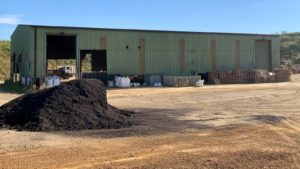Welcome to Boughton Quarry.
Safety is everyone’s number one priority. Please have a read through of the below to familiarise yourself with the site and the policies.
If you have a question at any time, please get in touch with your site contact or use the details below.

Landfill services at Boughton Quarry:
Site Address:
Boughton Quarry
Brampton Lane
Boughton
Northampton
NN6 8AA
PPE requirements onsite
When you enter the work area, make sure you have the correct PPE. PPE is your last line of defence should you come into contact with a hazard on site. Hi-viz helps make sure you are seen. Safety boots give you gip and protect your feet. Hard hats are easily replaced, but your skull isn’t. It can’t protect you if you don’t wear it. Wear your hard hat, safety boots and hi-viz vest as a minimum, along with any additional PPE required for the task being carried out.
Each site has unique hazards and work operations, no two sites are the same. Make sure you know what is happening so that you can work safely. Your induction is important; it tells you where to sign in, where to go, what to do, and what to avoid. Don’t start work without one.
Slips and trips might not seem like a major problem compared to other high-risk work happening on the site, but don’t be fooled. Remember to keep your work area tidy throughout to reduce the number of slip and trip hazards. Pay particular attention to areas such as access and escape routes. If you see an issue raise to supervisor & facitilites@bennie.co.uk
Actions speak louder than words. Especially on sites where one wrong move could put you in harm’s way. Set a good example, think safe and act safely on site.
You are responsible for your own behaviour. Make sure you remain safety aware throughout your time with us.
Follow construction safety signs and procedures. These should be explained to you in your induction (rule number 2). Your employer should ensure a risk assessment is carried out for your activities. Make sure you read and understand it. Control measures are put in place for your safety. Make sure they are in place and working before you start.
Make sure your work area is safe. Know what is happening around you. Be aware. According to HSE statistics, 14% of fatalities in construction were caused by something collapsing or overturning, and 11% by being struck by a moving vehicle (2014/15-2018/19).
Don’t work at height without suitable guard rails or other fall prevention. Don’t enter unsupported trenches. Make sure you have safe access. Don’t work below crane loads or other dangerous operations.
If you notice a problem, don’t ignore it, report it to your supervisor immediately to your line manager and safety@bennie.co.uk. Fill out a near-miss report, an incident report, or simply tell your supervisor. Whatever the procedure in place on your site for reporting issues, use it.
Action can only be taken quickly if the management has been made aware of the problem. The sooner problems are resolved the less chance for an accident to occur.
If somethings not working, or doesn’t look right, follow rule number 7 and report it. Do not try and force something, or alter something, if you’re trained to or supposed to.
Never remove guard rails or scaffold ties. Do not remove machine guards. Do not attempt to fix defective equipment unless you are competent to do so. Do not ever tamper with equipment without authorisation.
One tool does not fit all. Using the correct tool for the job will get it done quicker, and most importantly, safer. Visually check equipment is in good condition and safe to use before you start.
Unsure what to do? Or how to do something safely? Or you think something is wrong? Stop work, and ask. It takes 5 minutes to check, but it might not be so easy to put things right if things go wrong. It’s better to be safe than sorry. Mistakes on sites can cost lives, don’t let it be yours.